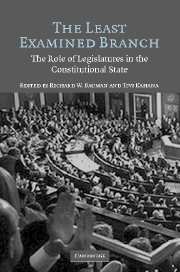Book contents
- Frontmatter
- Contents
- Foreword: Legislatures in the Constitutional State by Amy Gutmann
- Contributors
- New Ways of Looking at Old Institutions
- PART ONE LEGISLATURES AND DEMOCRATIC THEORY
- PART TWO LEGISLATING AND DELIBERATING IN THE DEMOCRATIC LEGISLATURE
- PART THREE CONSTITUTION MAKING BY LEGISLATURES: THE EXPLICIT VERSION
- PART FOUR CONSTITUTION MAKING BY LEGISLATURES: THE IMPLICIT VERSION
- PART FIVE CONSTITUTIONAL INTERPRETATION AND APPLICATION BY THE LEGISLATURE
- PART SIX IS LEGISLATIVE CONSTITUTIONALISM POSSIBLE?
- PART SEVEN THE LEGISLATURE IN DIALOGUE: DOMESTIC AND INTERNATIONAL CONTEXTS
- 25 Disobeying Parliament? Privative Clauses and the Rule of Law
- 26 Look Who's Talking Now: Dialogue Theory and the Return to Democracy
- 27 An International Community of Legislatures?
- 28 Legislatures in Dialogue with One Another: Dissent, Decisions, and the Global Polity
- Index
28 - Legislatures in Dialogue with One Another: Dissent, Decisions, and the Global Polity
Published online by Cambridge University Press: 06 August 2009
- Frontmatter
- Contents
- Foreword: Legislatures in the Constitutional State by Amy Gutmann
- Contributors
- New Ways of Looking at Old Institutions
- PART ONE LEGISLATURES AND DEMOCRATIC THEORY
- PART TWO LEGISLATING AND DELIBERATING IN THE DEMOCRATIC LEGISLATURE
- PART THREE CONSTITUTION MAKING BY LEGISLATURES: THE EXPLICIT VERSION
- PART FOUR CONSTITUTION MAKING BY LEGISLATURES: THE IMPLICIT VERSION
- PART FIVE CONSTITUTIONAL INTERPRETATION AND APPLICATION BY THE LEGISLATURE
- PART SIX IS LEGISLATIVE CONSTITUTIONALISM POSSIBLE?
- PART SEVEN THE LEGISLATURE IN DIALOGUE: DOMESTIC AND INTERNATIONAL CONTEXTS
- 25 Disobeying Parliament? Privative Clauses and the Rule of Law
- 26 Look Who's Talking Now: Dialogue Theory and the Return to Democracy
- 27 An International Community of Legislatures?
- 28 Legislatures in Dialogue with One Another: Dissent, Decisions, and the Global Polity
- Index
Summary
Much academic work on legislative dialogue focuses on legislatures in conversation with other actors within the state. This chapter switches the focus to a different type of conversation: legislatures in dialogue with one another. Specifically, this chapter draws on a robust empirical literature suggesting that nation-states function like members of a “global polity,” much as individuals are embedded in their own societies. They thus follow one another's lead just as individuals do. These empirical findings raise an intriguing policy question: Given the tendency of nation-states (and their legislatures) to engage in mimicry, how do we improve the quality of interlegislative dialogue?
This chapter offers an unusual response to that question. It argues that better decision making within legislatures may depend on variation among them. Drawing on a divergent set of literatures – global polity research, the democratic experimentalism literature, and Cass Sunstein's work on dissent – this chapter discusses a question relevant to any inquiry about improving legislative decision making: how to encourage productive dissent (at least under a Millian account) in the legislative process. The chapter is not intended to offer a fully developed set of answers to that question or even an in-depth analysis of the costs and benefits of the alternatives proposed here. Offered in the spirit of a thought experiment, the chapter merely proposes a more precise set of analytic tools for considering it.
Information
- Type
- Chapter
- Information
- The Least Examined BranchThe Role of Legislatures in the Constitutional State, pp. 547 - 566Publisher: Cambridge University PressPrint publication year: 2006
Accessibility standard: Unknown
Why this information is here
This section outlines the accessibility features of this content - including support for screen readers, full keyboard navigation and high-contrast display options. This may not be relevant for you.Accessibility Information
- 1
- Cited by
